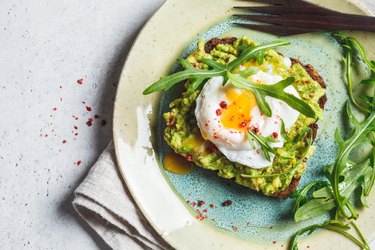
With the popularity of low-fat and fat-free diets, fat has been vilified for ages. And while eating too many saturated fats isn't a great idea for heart health, fat doesn't deserve the bad rap it gets.
Let's be clear: Fat is not your foe. In fact, the opposite is true: Fat is your friend, a bestie you can't live without. Literally.
Video of the Day
Video of the Day
"Fat is an essential macronutrient that performs multiple functions in the body," says registered dietitian Amanda Holtzer, RD. That means if you deprive yourself of dietary fats, you can disrupt your bodily systems and harm your health.
So how can you tell if you're missing too much of this massively important macro? Look for the following signs.
1. You’re Always Hungry
Persistent hunger pangs are a telltale sign that you're slacking in the fat department.
"Fats play a significant role in satiety (aka how full and satisfied you feel)," Holtzer says.
Here's why: Fats slow down gastric emptying, Holtzer says. That means it takes longer for your stomach to empty its contents into the intestines and to digest them, she explains. And this keeps you feeling fuller for longer.
So, if you're omitting fat, you're likely to feel hungry soon after a meal.
2. You’re Always Tired
Always exhausted? A famine of fat in your diet may be to blame.
That's because fat supplies your body with energy (read: fuel) in the form of calories. Indeed, "One gram of fat contains 9 calories," Holtzer says. That's more than double the number of calories from a gram of carbs or protein (4 calories each), she adds.
So "if you cut fat from your diet, you're likely cutting a significant number of calories, which can lead to feelings of fatigue," Holtzer says.
3. Your Joints Ache
If your joints are feeling creaky and cranky, the culprit may be a lack of healthy fats on your plate.
That's because inflammation in the body is one of the top causes of achy joints, Holtzer says. And certain types of dietary fat — including monounsaturated fats, polyunsaturated fats and omega-3 fatty acids — can help reduce inflammation and contribute to overall improved joint health, she says.
So, when you exclude fats, your joints don't enjoy these anti-inflammatory, lubricating effects.
4. You’re Getting Sick More Often
Can't shake the sniffles? Believe it or not, if you don't eat enough fat, it can make you sick. That's because "not eating enough dietary fat can cause several micronutrient deficiencies," Holtzer says.
Here's why: Certain vitamins (called fat-soluble vitamins) can only be absorbed along with dietary fats, i.e., the fats that you eat. So, if you don't get an adequate amount of fats, you can't soak up these nutrients, Holtzer explains.
And without essential vitamins and minerals — which help your body fight illness — you can become more susceptible to sickness, Holtzer says.
Take the fat-soluble vitamin E for example. "Vitamin E is an antioxidant powerhouse in the body and protects our cells from damage," Holtzer says. So, when you don't get enough of it, your immune system may weaken, she says.
And long-term, lack of fat can even hinder your overall health. Remember: Healthy fats are anti-inflammatory. So, without them, you may have increased inflammation in your body, Holtzer says. And chronic inflammation contributes to many serious medical conditions, such as heart disease, stroke, diabetes and cancer.
5. You Have Brain Fog
If you're feeling less sharp lately, an insufficient fat intake may have something to do with it.
"Did you know that the human brain is about 60 percent fat?" Holtzer says. "So, it stands to reason that the brain needs fat to perform at its best."
Case in point: "A diet high in monounsaturated fats (think: olive oil, nuts and avocados) can increase the production of acetylcholine, a neurotransmitter essential for learning and memory retention," Holtzer says.
Similarly, research has shown that increased consumption of DHA (a specific omega-3 fatty acid) is linked to decreased rates of mental health conditions like attention deficit disorder (ADD), depression and bipolar disorders, Holtzer says.
All this is to say, when your diet lacks healthy fats, it's likely your brain won't function optimally.
Related Reading
6. Your Skin Is Dry
A lack of fat might explain why your skin seems less soft and supple lately. Yep, certain fats play an integral role in skin function and appearance, Holtzer says.
For example, "omega-3 and omega-6 fatty acids are precursors to molecules called eicosanoids, which significantly influence skin inflammation," Holtzer says. "And polyunsaturated fats (like those found in salmon, walnuts and flaxseeds) help produce and maintain cell membranes of the skin's natural oil barrier," she adds.
Put another way: If you want glowing, smooth skin, start eating healthy fats.
7. You Have Hair Loss
If your hair is as dry and brittle as hay or it's shedding a lot lately, a lack of dietary fat may be a factor.
"Just like the rest of the body, your hair needs certain nutrients to remain strong, and dietary fats in particular are essential for hair health," Holtzer says.
But when you fail to get enough fat, your scalp will feel the effects. That's because "healthy fats can help lubricate the stratum corneum [i.e., the outer most layer of the skin], which promotes scalp hydration and improves hair integrity," Holtzer says.
8. Your Period Is Irregular
If you don't eat enough fat, it may throw your monthly menses out of whack. That's because hormonal imbalances can happen when you don't get enough fat, Holtzer says.
It's true: "Fats are the building blocks of estrogen and progesterone," according to the Foundation for Female Health Awareness. So, if you're not eating enough of them, it can affect your regular reproductive cycle, causing irregular or heavy periods, PMS or anovulation (when you don't ovulate during your menstrual cycle).
What Happens if You Eat No Fat at All?

Fat plays a pivotal part in many bodily functions. If you eat a zero-fat diet, you will experience many negative health effects now and in the long run.
Vitamin deficiencies are a prime example of the damaging domino effect that can ripple through your body when you stop eating fats.
If you don't eat enough fat to properly absorb fat-soluble vitamins — all of which serve essential roles in your overall health — you may experience the following problems:
- Vitamin A deficiency: "Vitamin A plays an important role in the health, growth and proliferation of cells in the eyes," Holtzer says. A deficiency can lead to xeropthalmia (aka severe dry eyes), night blindness and blurred vision, she says.
- Vitamin D deficiency: "Vitamin D is integral to bone health, and without it, the body cannot effectively absorb calcium, which is the most essential nutrient for healthy bones and teeth," Holtzer says. This can cause a lower bone density, making you more prone to fractures and broken bones, and in severe cases, it can develop into osteoporosis (a disease that weakens bones), Holtzer says.
- Vitamin E deficiency: As we know, vitamin E is known for its antioxidant properties. "It is essentially our body's army, fighting against damage from free radicals," Holtzer says. In addition to a diminished immune system, a vitamin E deficiency can also cause things like muscle and/or nerve damage, Holtzer says.
- Vitamin K deficiency: "Vitamin K is essential in blood clotting," Holtzer says. "A deficiency in vitamin K can cause significant bleeding and increased bruising," she explains.
How Much Fat Should You Eat per Day to Stay Healthy?
"The dietary reference intake for daily fat is about 20 to 35 percent of total calories," Holtzer says. "If you eat about 2,000 calories per day, this looks like 400 to 700 calories from fat or about 44 to 77 grams," she explains.
But to be clear: "We want to get most of these fats from mono- and polyunsaturated fats and should aim to limit saturated fats to less than 10 percent of our daily calories," Holtzer says.
Monounsaturated fats include:
- Olive oil
- Almonds
- Pecans
- Pumpkin seeds
Polyunsaturated fats include:
- Walnuts
- Flaxseeds
- Salmon
- Mackerel
Omega-3 fatty acids include:
- Anchovies
- Halibut
- Salmon
- Sardines
- Avocado
- Eggs
How to Eat More Healthy Fat
Simple strategies to ensure you’re eating enough healthy fats, per Holtzer:
- Eat fatty fish once or twice per week
- Make homemade marinades and salad dressings with olive oil
- Snack on nuts and/or seeds daily
- Add seeds (like chia or pumpkin) to your morning oatmeal, yogurt or smoothie
- Use mashed avocado as a spread instead of mayo
Is this an emergency? If you are experiencing serious medical symptoms, please see the National Library of Medicine’s list of signs you need emergency medical attention or call 911.